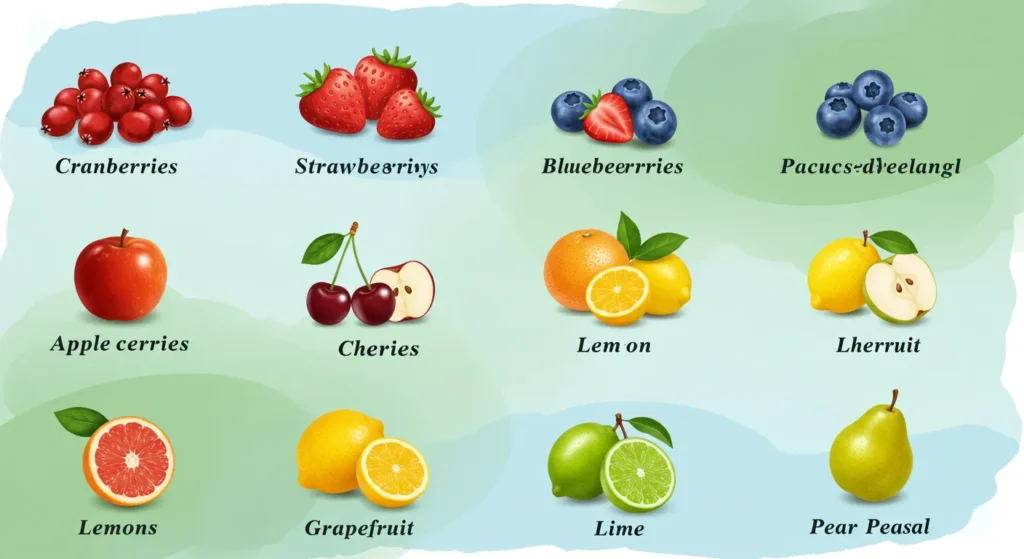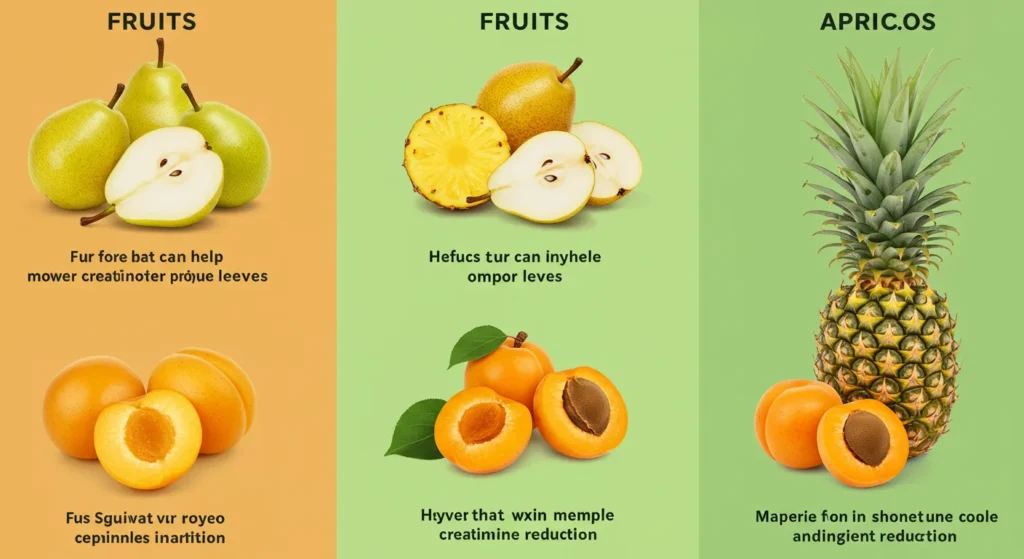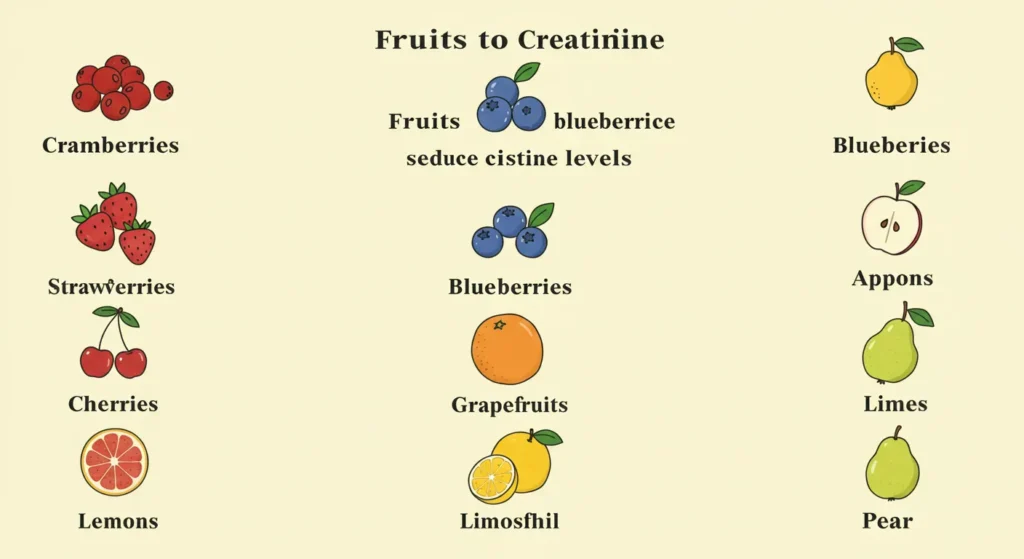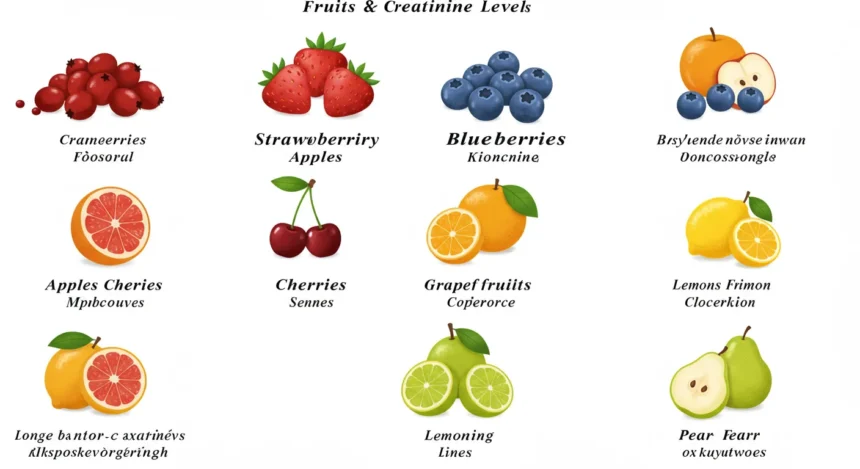Table of Contents
If you’re searching for a list of fruits to reduce creatinine level naturally, you’re in the right place. This guide explores ten hydrating, antioxidant-rich fruits that support kidney health and help manage creatinine levels, offering practical tips to incorporate them into your diet.
Creatinine and Its Importance
Creatinine is a waste product from muscle activity, created when creatine breaks down to supply energy. Healthy kidneys filter it out, but high levels in the blood can signal kidney issues.
Normal creatinine levels vary slightly by lab, but for adults, they typically range from 0.6 to 1.2 mg/dL. Men often have slightly higher levels (0.7–1.3 mg/dL) than women (0.6–1.1 mg/dL) due to differences in muscle mass.
Why High Creatinine Levels Matter

Elevated creatinine can indicate kidney dysfunction, often accompanied by symptoms like swelling, fatigue, or reduced urine output. For example, someone like John, a 45-year-old runner, noticed swelling in his feet and persistent tiredness, which led to a test revealing high list of fruits to reduce creatinine level.
Causes of Elevated Creatinine
Several factors can raise creatinine levels, impacting kidney function. These include:
- Kidney conditions like chronic kidney disease or infections.
- Dehydration from not drinking enough water.
- High protein diets, especially heavy in red meat.
- Intense exercise causing muscle breakdown.
- Medications like NSAIDs or certain chemotherapy drugs.
- Chronic conditions such as diabetes or high blood pressure.
For instance, Sarah, a busy professional, found her creatinine spiked after relying on processed foods and neglecting hydration during a hectic workweek.
How Fruits Support Kidney Health
Certain fruits are packed with antioxidants, fiber, and water, making them ideal for kidney health. They help reduce inflammation, fight oxidative stress, and keep you hydrated, all of which can lower creatinine levels naturally.
Incorporating a list of fruits to reduce creatinine level into your diet is a simple, delicious way to support your kidneys. Let’s dive into ten fruits that can make a difference.
Apples: A Fiber-Packed Choice
Apples are rich in pectin, a fiber that supports digestion and kidney health. With about 195 mg of potassium per medium apple, they’re a low-potassium option safe for kidney patients.
Try eating one medium apple daily as a snack or blended into a smoothie. For example, Lisa, a teacher, swaps sugary snacks for an apple to keep her energy steady and creatinine in check.
Cranberries: Guardians of Urinary Health

Cranberries are known for preventing urinary tract infections, thanks to proanthocyanidins. Their anti-inflammatory properties and high vitamin C content make them a kidney-friendly choice.
Enjoy half a cup of fresh cranberries or a quarter cup of dried ones daily. Adding them to oatmeal, like Mike does every morning, can boost flavor and kidney support.
Blueberries: Antioxidant Powerhouses
Blueberries are loaded with anthocyanins, which reduce inflammation and oxidative damage. Low in sodium and phosphorus, they’re perfect for maintaining healthy list of fruits to reduce creatinine level.
A cup of fresh or frozen blueberries can be added to yogurt or eaten solo. Emma, a retiree, sprinkles them on her cereal for a tasty, kidney-boosting breakfast.
Strawberries: Nutrient-Rich and Low in Sodium
Strawberries offer fiber, vitamin C, and manganese while being low in sodium and calories. They help reduce inflammation, supporting overall kidney function.
One cup of fresh strawberries daily can be a sweet treat. For instance, Tom blends them into a morning shake to keep his list of fruits to reduce creatinine level stable.
Watermelon: Hydration Hero
Watermelon’s high water content promotes hydration, crucial for flushing toxins from the kidneys. Its lycopene content also fights oxidative stress.
Two cups of cubed watermelon make a refreshing snack. Maria, a busy mom, keeps watermelon chunks in the fridge for a quick, hydrating bite.
Pineapple: Anti-Inflammatory Delight
Pineapple contains bromelain, an enzyme with anti-inflammatory benefits. Low in potassium and high in fiber, it’s a great addition to a kidney-friendly diet.
Try one cup of fresh pineapple chunks daily. Jake, a fitness enthusiast, adds pineapple to his post-workout smoothie for its kidney-supporting benefits.
Red Grapes: Packed with Resveratrol
Red grapes are rich in resveratrol and flavonoids, which reduce inflammation and support kidney health. They’re hydrating and low in sodium.
A cup of red grapes daily can be a simple snack. Rachel, a student, packs them for lunch to stay hydrated and support her kidneys.
Cherries: Sweet and Protective
Cherries offer antioxidants and anti-inflammatory compounds, with low potassium levels. They provide vitamins A and C, aiding kidney function.
One cup of fresh cherries is a great daily serving. For example, David enjoys them as a dessert to keep his list of fruits to reduce creatinine level in check.
Pomegranates: Heart and Kidney Allies
Pomegranates are rich in antioxidants and help manage blood pressure, a key factor in kidney health. They’re also a good source of fiber and vitamins C and K.
Half a cup of pomegranate seeds daily can be sprinkled over salads. Anna, a nurse, adds them to her meals for a nutrient-packed boost.
Kiwi: A Vitamin C Powerhouse
Kiwi is high in vitamin C and fiber, with low potassium List of Fruits to Reduce Creatinine Level, making it ideal for kidney health. It also supports digestion, which indirectly aids kidneys.
One or two kiwis daily can be eaten fresh or added to smoothies. Mark, a writer, loves kiwi slices for a quick, kidney-friendly snack.
Additional Tips for Managing Creatinine Levels

To complement the list of fruits to reduce creatinine level, consider these habits:
- Stay Hydrated: Drink at least eight glasses of water daily, unless advised otherwise by a doctor.
- Eat a Balanced Diet: Focus on whole grains, low-potassium vegetables, and lean proteins like chicken or fish.
- Limit Certain Foods: Avoid high-protein foods, processed snacks, and high-potassium options like bananas or avocados.
- Exercise Moderately: Choose gentle activities like walking to avoid raising creatinine through muscle breakdown.
- Manage Health Conditions: Control diabetes or high blood pressure to protect kidney function.
For example, Laura, who manages diabetes, works with her doctor to balance her diet with fruits like apples and berries while monitoring her creatinine.
When to Seek Medical Advice
Consistently high or suddenly spiking List of Fruits to Reduce Creatinine Level can signal serious kidney issues. If you notice symptoms like swelling, nausea, or changes in urination, consult a healthcare professional immediately.
Individuals with diabetes or a family history of kidney disease, like James, who monitors his levels regularly, should be especially vigilant. Always seek medical guidance before making major dietary changes.
Final Thoughts
Incorporating a list of fruits to reduce creatinine level naturally, like apples, cranberries, and watermelon, can support kidney health and lower creatinine levels. Pair these fruits with hydration, a balanced diet, and medical advice for the best results, and take control of your kidney health today.
FAQs
What is creatinine, and why does it matter?
Creatinine is a waste product from muscles. High levels may indicate kidney issues, so managing it is key for kidney health.
Which fruits help lower creatinine levels?
Apples, cranberries, blueberries, strawberries, watermelon, pineapple, red grapes, cherries, pomegranates, and kiwi support kidney function.
How do fruits help reduce creatinine?
Fruits rich in antioxidants and water reduce inflammation, support hydration, and help kidneys filter creatinine effectively.
How much fruit should I eat daily?
Aim for 1 apple, 1 cup berries, 2 cups watermelon, or 1/2 cup pomegranate seeds daily, but consult a doctor for kidney issues.
Can I eat bananas to lower creatinine?
Bananas are high in potassium, so moderation is key. Consult a doctor before including them in a kidney-friendly diet.
Do I need to avoid any foods?
Limit high-protein foods, processed snacks, and high-potassium foods like avocados or tomatoes to support kidney health.










